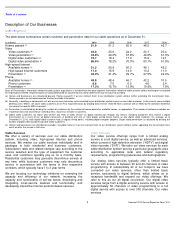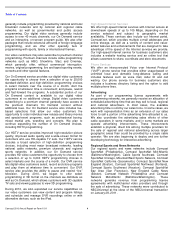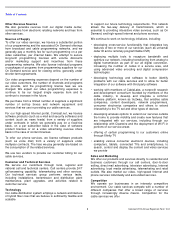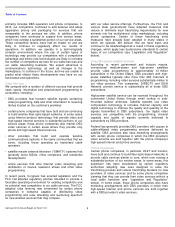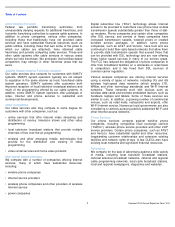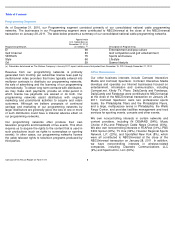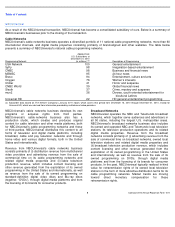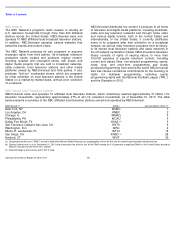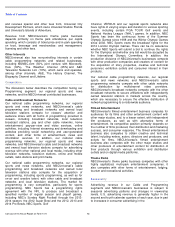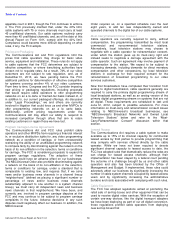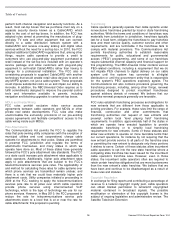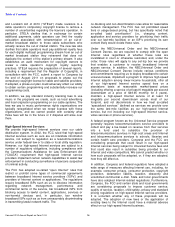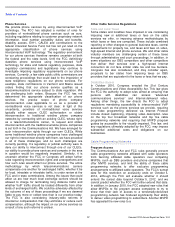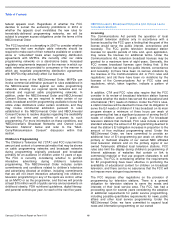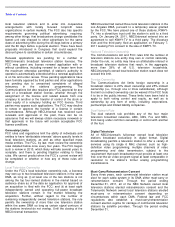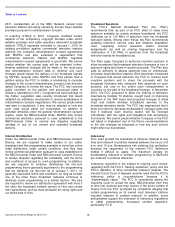Comcast 2010 Annual Report Download - page 17
Download and view the complete annual report
Please find page 17 of the 2010 Comcast annual report below. You can navigate through the pages in the report by either clicking on the pages listed below, or by using the keyword search tool below to find specific information within the annual report.
Table of Contents
13
Comcast 2010 Annual Report on Form 10-
K
spring and in the period leading up to and including the
holiday season. U.S. advertising revenue is also cyclical,
benefiting in even-numbered years from advertising placed
by candidates for political office and issue-oriented
advertising and from increased demand for advertising time
in Olympic broadcasts. Revenue also fluctuates due to the
timing and performance of theatrical, home entertainment
and television releases, and due to seasonal increases in
theme park attendance.
Legislation and Regulation
Our businesses, including NBCUniversal’s businesses, are
subject to regulation by federal, state, local and foreign
authorities under applicable laws and regulations, as well as
under agreements we enter into with franchising authorities.
In addition, our businesses are subject to compliance with the
terms of the FCC Order approving the NBCUniversal
transaction (the “NBCUniversal Order”) and a consent decree
entered into between us, the Department of Justice and five
states (the “NBCUniversal Consent Decree”).
The Communications Act of 1934, as amended (the
“Communications Act”), and FCC regulations and policies
affect significant aspects of our businesses, including cable
system and broadcast station ownership, video services
customer rates, carriage of broadcast television stations,
broadcast programming content and advertising, how we
package our programming to customers and other providers,
access to cable system channels by franchising authorities
and other parties, the use of utility poles and conduits, and
our high-speed Internet and phone services.
Legislators and regulators at all levels of government
frequently consider changing, and sometimes do change,
existing statutes, rules, or interpretations of existing statutes
or rules, or prescribe new ones. We are unable to predict any
such changes, or how any such changes will ultimately affect
the regulation of our businesses. In addition, we always face
the risk that Congress or one or more states will approve
legislation significantly affecting our businesses. The
following paragraphs describe existing and potential future
legal and regulatory requirements for our businesses,
including those of NBCUniversal.
NBCUniversal Order and NBCUniversal Consent Decree
In connection with the NBCUniversal transaction, the
NBCUniversal Order and the NBCUniversal Consent Decree
incorporated numerous commitments and voluntary
conditions made by us and imposed numerous conditions on
our businesses relating to the treatment of competitors and
other matters. Among other things, (i) we are required to
make certain of our cable, broadcast and film programming
available to bona fide online video distributors under certain
conditions, and they may invoke commercial arbitration to
determine what programming must be made available and
the price, terms and conditions that apply; (ii) multichannel
video programming distributors (“MVPD”) may invoke
commercial arbitration to determine the price, terms and
conditions for access to our broadcast stations, cable
networks and regional sports networks; (iii) we are prohibited
from discriminating against cable programming networks on
the basis of their non-affiliation in the selection, terms or
conditions for carriage, under a standard that is comparable
to existing law; (iv) we must comply with the FCC’s open
Internet rules regardless of whether these rules are
invalidated in court or otherwise rescinded, and those rules
will apply to any set
-top box we provide that enables a
customer to receive high-speed Internet services; (v) we
must satisfy various other conditions relating to our high-
speed Internet services, including deploying broadband to
certain unserved areas, implementing a program to improve
high-speed Internet adoption among lower-income
households, offering all our customers a “stand-alone” high-
speed Internet service, and maintaining a high-speed Internet
service of at least 12 megabits per second across most of our
footprint; and (vi) we must renew our distribution agreement
with Hulu if the two other broadcast network owners of Hulu
also renew their agreements, and we must relinquish all
voting rights and our board seat in Hulu. These and other
conditions and commitments relating to the NBCUniversal
transaction are of varying duration, ranging from three to
seven years. Although we cannot predict how the conditions
will be administered or what effects they will have on our
businesses, we do not expect them to have a material
adverse effect on our business or results of operations. The
NBCUniversal Consent Decree is subject to a review process
in federal district court, whereby the court must determine
whether entry of the consent decree is in the public interest.
Cable Services
Video Services
Ownership Limits
We currently serve approximately 23.1% of the subscribers
served by MVPDs nationwide. In August 2009, a federal
appellate court struck down an FCC order that had
established a 30% limit on the percentage of MVPD
subscribers that any single cable operator could serve
nationwide. While there is currently no limit on the number of
video subscribers that a single cable operator can serve
nationwide, the FCC may initiate consideration of a new limit.
However, even without the adoption of a new limit, federal
regulators (including the FCC and the Federal Trade
Commission (“FTC”) and/or the Department of Justice) could
refuse to approve certain transactions that increase the
number of video subscribers we serve.
The FCC is assessing whether to revise a limit on the
number of affiliated programming channels that a cable
operator may carry on a cable system. The FCC’s previous
limit of 40% of the first 75 channels carried on a cable system
was struck down by a federal


